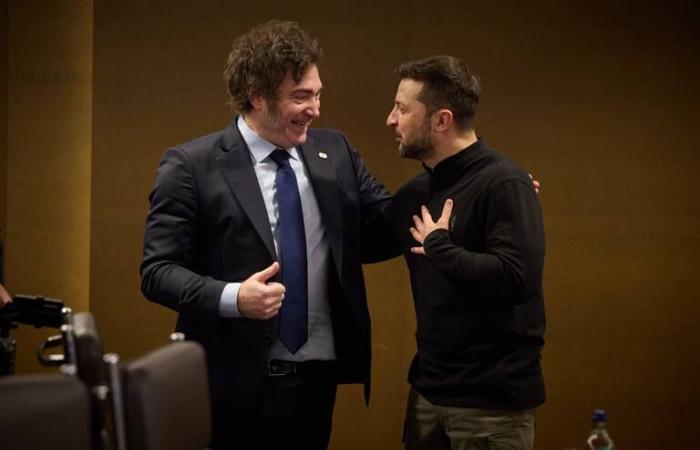Hear
Olga Onuchborn in Warsaw and raised in kyiv, lives in Manchester – where she became the first holder of a professorship of Ukrainian politics in the English-speaking world-, dialogue with THE NATION from New York, but misses Buenos Aires. “The best city,” says the academic, who lived in the Argentine capital for four periods to study the 2001 crisiswhich he compared in a book to a crucial moment in Ukraine in 2004 (the Orange Revolution).
Now more focused on impact of the Russian invasion of Ukraine and on the political phenomenon into which he transformed Volodymyr Zelensky -which he develops in his latest book, The Zelensky effect-, Onuch highlights the high approval of the Ukrainian president beyond various ups and downs and highlights the Red line which, in his opinion, cannot be crossed in a hypothetical negotiation to end the war, in the face of Peace Summit in Switzerland this weekend. “The territory [ocupado por Moscú] It is non-negotiable for more than 80% of the population. It is a position that has hardened in the last year”warns the author of Mapping mass mobilizations: understanding revolutionary moments in Argentina and Ukraine, who was also a visiting professor at the Di Tella University. With her offensive, Russia managed to control about 18% of Ukraine’s territory.
His stays in Buenos Aires – the last one, in 2020 – led Onuch to draw similarities between Argentine and Ukrainian societiesand was surprised by Zelensky’s affinity with Javier Milei. “I don’t see much in common between them,” says the academic, who writes columns for different international media.
-After more than two years of invasion, where is Ukraine?
-The war is in a certain way stagnant, in a Deadpoint, because Ukraine never receives enough military support it needs to take the next step. AND is always on the wrong side, with delays in terms of action on the battlefield. It is very clear that if Western military assistance had been delivered earlier, we would not have had the winter [boreal] that we had, and we would have a different plan for the next few months. The Army always has to react to the step that Russia took.
-What do you think are the government’s options to negotiate an exit? Can the Peace Summit be of any use?
-What the summit shows is that Ukraine’s political and military leaders are very clear about their terms for ending the war and also international law in relation to this. We see that there is a certain international acceptance, not only on the part of kyiv’s closest allies. But of course, no matter how this is presented, the Russians will suggest that another type of negotiation or agreement should take place. What is important to know is that the territory [ocupado] it is non-negotiable for a very high percentage of Ukrainians. This position was hardened. In 2022 it was 75%, and at the end of 2023 81% considered that the country should never cede territory to Russia. That is surprising. We have just said that the war is essentially stuck on the battlefield and Russia demonstrates an inability to go further. But in the context of a war that is slow and longwhat is exhausting for citizens, are hardening their position in the territorial commitment. And that’s something that I know Zelensky and his team understand very well, because they pay attention to this type of data. They cannot compromise the territory because the civilian population could turn against them if they decided to do something that the citizens do not support. It is incredible that people who have suffered more than two years of bombings, trauma and extreme conditions now harden their postures, because in the face of so much fatigue we would expect them to say “well, [Rusia] take that”. Zelensky knows he can’t risk polarization, so he won’t compromise territory. Not now. Territorial integrity, which includes Crimeait will be something that will not be touched for a long time.
-To what extent does this fatigue, the new recruitment law, the corruption cases and the lack of elections impact Zelensky?
-Of course the changes in the mobilization law will always be very unpopular in different segments. At the same time, others understand your need. The fact that Zelensky’s popularity has remained around 65-70% all this time is surprising given everything that happened. Support is still above what he had before the full-scale invasion of 2022. It is very high. When you ask Ukrainians if there should be elections, 80% say no during martial law [que mantiene a Zelensky en el poder pese a que su mandato terminó el 20 de mayo]. And 70% indicate that he should remain in power until the end of martial law. Obviously, at some point there will have to be some type of vote. But it’s notable that there are people who probably say they don’t trust Zelensky that much, but still prefer to see him as president.
-Is the decision to postpone elections justified, or do you think the decision threatens democracy in Ukraine?
-Elections in themselves are not always necessarily a democratizing moment. They can be, especially presidential elections, very divisive, polarizing and non-democratizing moments for countries. But In terms of the war itself, it is not legal to hold elections during martial law, it would even be very complex due to logistics and costs.. And now there is no support for holding elections among the Ukrainian population, nor among the political elite. That precisely shows that there is a certain stability.
-In political terms, is it the most complex moment for Zelensky?
-No. His support diminished, it is true. But in the midst of the war, and before the pandemic, his support remained higher than that of any of his predecessors. I think his worst moment was at the beginning of the invasion. Nobody knew what to expect, whether they would survive, and you had to have a lot of faith in the Army. That was probably the moment, from outside Ukraine, when many thought “what will happen to Zelensky now?” I’m surprised by the resilience of his approval rating.. If there were elections today, he would surely win.
-Do you see any other leaders in the government or in the opposition who are emerging in this situation?
-I think you know the answer. There is no one who has emerged as a clear competitor.
-Were you surprised by the process that took Zelensky from his career in television to the leader he became?
-I was surprised because I was not paying attention to what was happening with him before 2019 [cuando ganó las elecciones]. We missed how citizens viewed and understood his political platform and messages, we weren’t looking in the right places. Zelensky was the CEO of the country’s largest entertainment media network, a very powerful person. He was part of the political leadership in a certain way because had an influential role. He knew them all and he was a expert administrator, was repeatedly underestimated. And there is nothing more dangerous than a very capable and underrated person. That’s certainly what happened in 2019.
-What are your strengths and weaknesses as a leader?
-Everyone focuses on their communication skills, that’s a talent. But much more important is its empathy and understanding of ordinary citizens. I think another strong point is that he is a good manager, he builds teams and he has been very good in the “house cleaning” when necessary, including people perceived to be very close to him. In terms of weaknessI think the fundamental thing was his naivety about Russia. He was incredibly naive when it came to relations between Russia and Ukraine and the end of the war in the Donbass region, and that It’s something Zelensky will have to live with for a long time.. He learned during his presidency, and since the 2019 Paris summit with Vladimir Putin, Emmanuel Macron and Angela Merkel he began to change course. But perhaps the things that led to that naive position also altered his preparation for the invasion. I hope there’s nothing you’re so naive about today that makes you miscalculate as much as you did in 2019.
-In your latest book you show how identity and civic duty, or their absence, are fundamental to shaping political behavior in contexts of democratization. How do you think this manifests itself in times of war?
-It reinforces it, especially if the political leadership emphasizes it. Zelensky constantly emphasizes the civic duty of Ukrainians, and that to win the war we must all be good citizens. Civic identity is also very strong in the Argentinaand it’s something that I think Argentines understand Ukrainians particularly wellthat perhaps other Europeans do not do it in the same way.
-Milei and Zelensky have shown very good harmony, do you see anything in common between the two?
–No, I don’t see much in common between them. I was honestly surprised that Zelensky went to Milei’s inauguration. I understand why it is especially important to maintain a close relationship with Latin American leaders and citizens. They are very different leaders, with different platforms and positions on the political spectrum.. Although it is true that there is a history between both countries, and that their populations are also very similar. I think ordinary Argentines understand that they play a role in politics, and it is the same as Ukrainians. And it’s not just that they understand it, but it’s the right to do it. And if someone tried to take that away from them, then they would demonstrate it very clearly. In terms of social understanding of the role of citizens, I arrived in Argentina expecting something different, and in every place I went I asked myself, “why are they saying the same things as the Ukrainians?”.






